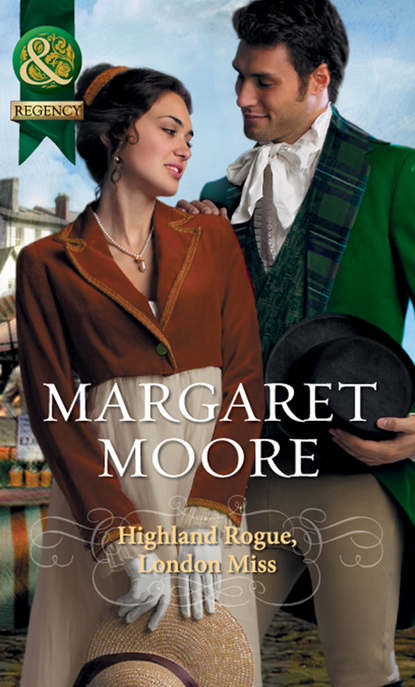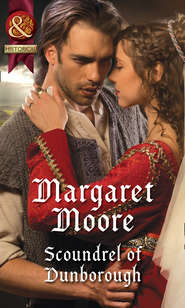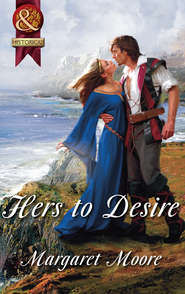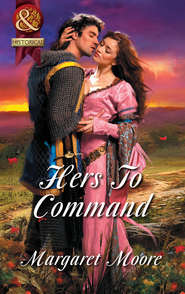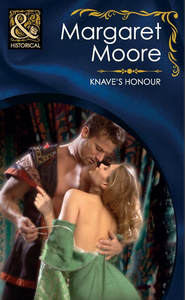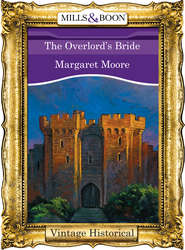По всем вопросам обращайтесь на: info@litportal.ru
(©) 2003-2025.
✖
Highland Rogue, London Miss
Настройки чтения
Размер шрифта
Высота строк
Поля
His lips lifted in another of his insolent grins. “Make you anxious, do I?”
“It’s rude.”
“If you’re going to criticize me for staring,” he said, “you shouldn’t look at a man the way you were looking at me this morning.”
“I don’t know what you mean.”
“You were looking at me as if you were imagining what I looked like naked.”
“I was not!” she exclaimed—and she hadn’t been. When he first entered the drawing room, she’d been thinking that he looked even more handsome in his new clothes and freshly shaven. It would surely increase his considerable vanity if she admitted that, though, so instead she told a partial truth. “I was worried about this journey and what we have to accomplish.”
“You don’t find me handsome?”
What a conceited question! He didn’t deserve an honest answer. “No.”
Instead of looking suitably quashed, his lips curved up in the most devilish, triumphant smile she’d ever seen as he moved toward her. “One of my particular skills is being able to tell when somebody’s not being completely honest and forthcoming, and you, Miss McCallan, are not.”
She backed away. “I was not picturing you completely nude this morning.”
She had later, but not that morning.
“Not completely nude?”
“Yes! No, that is …” She hit the windowsill and could go no farther. “You stay away from me! Don’t you dare kiss me!”
With a look that combined astonished innocence with devilish satisfaction, he spread his arms. “Miss McCallan, I assure you I have absolutely no intention of kissing you again—unless you’d like me to, of course. Then I place no limits on my actions.”
“You … you … you!” She jabbed her finger at him as if that would ward him away. “Stay back or I’ll call for help!”
He didn’t move, and his smile turned into a leer. “You could call for help, but we’re supposed to be husband and wife, remember? That gives me the right to do whatever I like with you.”
At his arrogant, yet ignorant, answer, a thrill of triumph surged through her. “No, it does not. Among other things, the Habeas Corpus Act of 1679 renders it illegal for a husband to imprison his wife in order to force conjugal relations.”
That sobered him, and his leer became a scowl. “I suppose if any woman alive can be counted on to know such a thing, it’s you. Fortunately for us both, I wasn’t going to kiss you.”
“Now who’s lying?” she charged, even though she had no idea if that was really his intention, or not. “Not that it would be a compliment if you were,” she added primly. “You would probably kiss almost any woman over fifteen and under seventy, and for the most minor of reasons.”
“While you’ll probably never be kissed again!” he retorted as he turned on his heel and went out, slamming the door behind him like the arrogant, spoiled wastrel he was.
Even if he kissed like a tender, compassionate lover.
Chapter Four
“I’ ve brought your supper, madam,” a man called out from behind the closed door of the bedroom of the inn sometime later.
MacLachlann hadn’t returned and Esme wouldn’t have been surprised to learn he intended to remain below for the entire night.
“Come,” she replied, setting the law book on the table beside her chair near the window. After MacLachlann’s childish exit, she’d decided to brush up on the differences between Scottish and English law so she would be prepared. She certainly wasn’t going to waste any time pondering MacLachlann’s mental state, or any abilities—sexual or otherwise—he might possess.
Then MacLachlann himself strolled into the room. He was carrying a large tray holding covered dishes, as if he were a waiter.
This was hardly the behavior of a nobleman, and one possible explanation instantly came to mind—except that he didn’t appear to be drunk. Indeed, his gait was remarkably steady, as if the tray and its burden weighed next to nothing.
Not sure what to say or do, she picked up her book and got out of the way so he could put the tray on the table.
“You’re going to ruin your eyes reading in the dark,” he said evenly, and as if they hadn’t quarrelled earlier.
If he was going to ignore what had happened, so could she. “It was still light enough to read. And I note an earl would hardly carry a tray.”
“He does if he’s hungry. I also told them that I wanted to make up for a silly quarrel with my wife.”
That would explain the slammed door, if others had heard it, and they probably had.
He gestured for her to sit. “Dinner is served, my lady.”
Although she didn’t consider their quarrel silly, they needed to work together, so she would behave as if there was a truce between them. She put her book on top of her trunk and took her place at the table before removing the napkin covering a small basket of freshly baked bread. It smelled heavenly.
Meanwhile, MacLachlann slid into his chair with his usual lithe, masculine grace. He always moved like that, as if he were part cat. “I don’t suppose that’s a novel,” he said, nodding at her book while buttering his bread.
“It’s about mortgages and promissory notes,” she replied, lifting the covering over the plate before her to reveal a dark, rich beef stew, with carrots and potatoes in thick gravy. It smelled nearly as good as the bread.
“Heaven spare me! And you didn’t fall asleep?”
“I enjoy research.”
“I dare say there are some people who enjoy having a tooth pulled, too,” MacLachlann reflected as he lifted a spoonful of stew.
Despite the necessity of getting along with him, both his tone and his words rankled. “Just as I suppose there are some people who enjoy drinking to excess.”
“I was never one of them.”
“Really?” she pointedly replied as he continued to eat with relish.
“I don’t deny I used to get drunk, and often. I deny that I ever enjoyed it.”
“Then why did you do it?”
He raised his eyes and regarded her with a disarming frankness. “To forget.”
What? she wanted to ask. What did he want to forget? His family? Some past misdeed? A woman?
But if she asked and he answered with that apparent honesty, she might find herself caring about him.
He looked down at his food. “I was a fool, wallowing in self-pity and blaming all my misfortunes on others—the gamesters who won what money I had, my supposed friends who deserted me when I had nothing left. My father, who never liked me. The rest of my family, with whom I had nothing in common. I believe I even blamed my mother for dying when I was a child. It was easier to do that than admit that I’d made terrible mistakes. Then one night I found myself on Tower Bridge, alone, drunk, penniless, thinking I would do the world a favor if I jumped and never surfaced.”
He raised his eyes to look at her again. “That’s when your brother found me. He’d heard I was in London from one of my false friends he was representing, and sought me out.
He took me to an inn, bought me dinner, told me he wanted my help, and that he would pay me for it. I’ve never gotten drunk since.”





